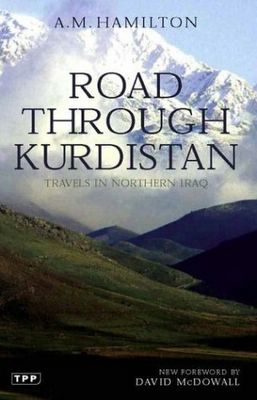
A book about the people from ground level.
"The real attraction of Road through Kurdistan lies in its warm humanity. Hamilton is utterly free of colonial superciliousness, despite the odd reference to the childlike simplicity of the natives. Learning of the Kurdish love for flowers, he sets about building a Kurdish garden of his own, bartering local species for eucalyptus seedlings brought up from Baghdad. He insists that his roadside camp conform to local traditions of hospitality. And, in the depths of winter, he hunts side by side with neighbouring tribesmen." Nicholas Birch, The Times Literary Supplement
The Literary Supplement (click on)
Snakes and robbers
A Review by Nicholas Birch
In the days before the fall of Saddam Hussein, visitors wishing to side-step the Turkish blockade on Iraqi Kurdistan had two options: enter via Syria, or via Iran. The first, a dash across the Tigris just upstream of an Iraqi tank regiment, made better copy. But the second was far grander, along a road that snakes a hundred miles through the parallel ridges of the Zagros mountains and plunges down two deep ravines before finally emerging on the Mesopotomian plain at Arbil.
Built between 1928 and 1932 as part of a British plan to speed access to Tehran, the road was the work of hundreds of Kurdish, Arab, Iranian and Christian labourers, almost all unskilled, led by the New Zealand engineer A. M. Hamilton. His book, republished as part of the fine Tauris Parke Paperbacks series, tells of the years they spent together.
There is plenty of action: touchy robber chiefs quick on the draw, murders to solve, a black snake that glides into the hut one night to avenge -- so Hamilton's guards say -- his killing of its mate. Above all, there is the long struggle to blast a path through the precipitous Rowanduz gorge "What a land was this in which to attempt to build roads", Hamilton exclaims when he first sees the Rowanduz river far below, tributaries rushing in at crazy angles. And when, two years later, the final bridge is laid in place, "from the depths of the canyon there arose the exultant roar of men's voices that reached almost to the mountain tops".
The real attraction of Road through Kurdistan lies in its warm humanity. Hamilton is utterly free of colonial superciliousness, despite the odd reference to the childlike simplicity of the natives. Learning of the Kurdish love for flowers, he sets about building a Kurdish garden of his own, bartering local species for eucalyptus seedlings brought up from Baghdad. He insists that his roadside camp conform to local traditions of hospitality. And, in the depths of winter, he hunts side by side with neighbouring tribesmen.
"As the shafts of light strike upwards and silhouette the peaks in an azure setting, cold, fatigue and the hunt are forgotten, and like three primitive savages we gaze spell-bound, lost in the beauty of it all . . . "Wallah!" say the Kurdish lads, and their single word is full of meaning."
Nicholas Birch is a freelance journalist based in Turkey.
